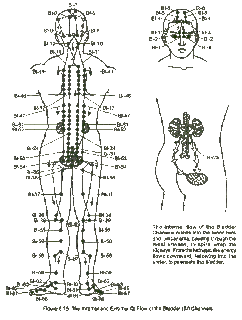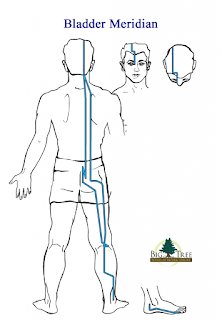The Urinary Bladder meridian is also known as the ‘guardian of peace’. It is the Yang counterpart of the Yin Kidney meridian, and both are associated with the Water element. The Urinary Bladder meridian is the meridian with most points in the whole meridian system, and symptoms can be manifold (as shown below) with many different areas of the body being affected.
Every full moon in Libra will affect this meridian, opening up a window of opportunity to more deeply balance this meridian, but also opening up a time where we might feel its imbalances most. These windows last from approximately a week before to 4-5 days after – some people will be more sensitive to it and experience a longer period of being affected.
The bladder is also called the “Minister of the Reservoir” and is responsible for storing and excreting the urinary waste fluids passed down from the kidneys. As an organ, this is the only function the bladder has.
However, as a meridian / energy system, the Bladder meridian is intimately related to the autonomous nervous system — it is the only meridian that flows through our brain and along the entire back and directly affects our nervous system as well as our emotional memory storage. The Bladder meridian runs along the back of the body from the eyes to the little toes, with 2 parallel branches flowing along each side of the spine (see below for a detailed description of its course). These four branches of the Bladder meridian directly influence the sympathetic & parasympathetic trunks of the autonomous nervous system, which regulates our fight-flight(-hide) response, and, in turn, all the body’s basic vital functions.
In the pressures of modern life many people suffer from an overly-activated sympathetic nervous system, causing a constant state of apprehension, fear, or worse. This can be accompanied by tension and pain along the spine and its periphery. Over time, it crystallizes into a fixed pattern of fear which can inhibit the decision-making capability and manifest as chronic high blood pressure, ADHD, bi-polar disorder, heart disease, panic attacks, and low libido.
Back tension and pain can be relieved by stimulating the energy flow along the spinal branches of the bladder meridian. Such stimulation induces total relaxation by switching the autonomous nervous system over to the restful, restorative, parasympathetic mode.
Meridian pathway:
The Urinary Bladder meridian, like the Gall Bladder meridian, starts at the eye. It begins (both left and right, as always with meridian paths) at the inner eye and goes up, across the forehead, to the crown of the head. One branch splits up here, enters the brain and then re-emerges at the scapula (shoulder blade) and runs just inside the line of the scapula down the spine to the buttocks, where it re-enters the body and runs to the urinary bladder and the kidneys (left and right).
The second branch – left & right – flows down from the crown, down the back of the neck and shoulders and runs just outside and parallel to the first branch. This branch continues down the back of the buttocks and legs, circles the outer ankles, runs along the outer edge of the foot, and ends in the small toe where the Kidney meridian begins.
Dr. Motoyama believes that the Ida and Pingala nadis correspond to the Urinary Bladder meridians, because they run along either side of the spine.
From the above explanations one can clearly see how it could be said that the Bladder meridian ‘rules the back of the body’. With some 80 meridian points in 4 lines running down the back, it is easy to see how the back is a fertile field for the storage of old wounds that can later become organ imbalances (e.g. kidneys), almost literally bearing the burden of the past. Feelings held here can include guilt, feelings of duty, but also feelings about sexuality, self-control, self-support and stability. Releasing the tension in the back and stimulating the bladder meridian will automatically release the stored psychic tension, thus resolving many physical and psychological problems.
The bladder, together with the kidneys and sexual organs, relates to the second chakra. The second chakra is connected to the Water element and key here is learning to step into the flow of life, without resistance and with deep trust for what is and what is to come. Over time, water can even shape the earth. The opposite of trust is fear – the emotion mainly associated with second chakra & water imbalances. Fear causes us to tighten and contract, and makes us cold and frozen. An imbalance in the Urinary Bladder channel is connected with the inability to cope with life and fear of change.
Few things in life disturb our spiritual well-being more than feeling that we have little or no vital energy or lifeforce, especially if this is accompanied with a sense of internal panic, raciness or overwhelm where we feel unable to meet life on its terms. We may freeze in fear, or thrash about in fear, imagining ourselves alone, isolated, without or even beyond help, facing a potentially terrifying future. In such circumstances, everything and everyone starts posing a threat. We want to hide, we feel we need to rest, we long for a hibernation that could restore our reserves. If you weren’t able to spend the winter in some form of hibernation, you might really feel that need surface now as Spring is demanding a different energy from us. We can become pre-occupied with self-preservation and – as our physical resources diminish still further – we could notice our will to live start diminishing as well.
As Paul Hougham writes in The Atlas of Mind, Body and Spirit: “Typically if we have an imbalanced bladder meridian we will be concerned with energy on an almost existential level – wondering if we have the strength to carry on. The nightmare that this can turn into for some is a parched and paranoid terror of fearing for our lives, so we can become frantic in seeking the barest scrap of refreshment and energy. But we can never hold water actively – it literally slips through our fingers, and energetically there is a level of trust and surrender required in order to be able to hold a vessel, a grail, to hold the waters of life. On the land, hard, dry earth will cause sudden rains to move on and pass by and we need a discipline of surrender and permeability in being able to hold this resource within our energy field.” (p. 156)
- Inability to urinate or the opposite: frequent and urgent urinating
- Painful urination
- Incontinence
- Dark or bloody urine
- Dehydration & thirst
- Bladder infections (for women this is often related to anger towards men)
- Men: swollen prostate
- Women: prolapsed uterus
- Fevers
- Pain in the ankles and kneecaps
- Backaches
- Headaches (esp. occipital)
- Pain in neck or shoulders, stiff neck
- Leg cramps and sciatic pains
- Nose bleeds
- Diabetes
- Aversion to cold or fear associated with cold environments
- Mental problems
- Timidity
- Fear
- Anxiety
- Jealousy
- Frustration
- Resentment & holding grudges
- Suspicion
- Anger
- Tearfulness
- Listlessness
- Control-issues
- Negative attitude
- Fear-based inflexibility of mind and emotions
- Radically changing moods
- Lack of confidence, or the opposite: over-enthusiasm
- Low libido
- Diseases of the lower limbs
- Drink lots of healthy living water (preferably fresh spring water or purified and remineralized water as you want to avoid chlorine & fluoride)
- Alkaline diet high in fresh fruits & vegetables
- Cruciferous vegetables
- Cranberry juice and cranberries in case of bladder infection – otherwise too acidic though.
- Goji berries & blueberries
- Black foods (black grapes, black olives, seaweeds, black sesame seeds, black seed, aubergines, …)
- Honeydew melon & water melon
- White horseradish (‘mooli’) — juiced, grated, in a salad, mooli pronthay, … & normal radishes
- Cucumbers & zucchini
- Celery
- Root vegetables: Sweet potatoes, yams, carrots, squashes
- Garlic & onions
- Fresh juice of 2 parts spinach and 1 part carrot
- Nuts & nut oils
- Relax and take everything with a little inner smile
- Salt, as it dries out the body – use only healthy salts like Himalayan, Celtic or unprocessed sea salt.
- Caffeine – coffee, black tea, green tea, caffeinated drinks — they cause profound dehydration
- Dehydration
- Excess emotional frustration & emotional stress
- Poor quality drinking water (esp. containing chlorine and fluoride)
- Hair dyes & cosmetics
- Heavy metals (in medicine, water, dental work, vaccines, …)
- Processed table salt
- Acidic-producing foods (alcohol, sugar, caffeine, sodas, wheat & gluten, hot peppers & chili, spicy foods, MSG, tomatoes, ..)
- Hold and massage the pinkie finger of each hand for 2 minutes on either side. Repeat as often as you like
- Wear black clothes
- Listen to calming (mantra) music
- Contract the muscles when you are urinating, to briefly stop the flow of urine. Do this daily to help prevent kidney stones.
- Wash your hair every 72 hours if you can — after 72 hours, the oil secretions from the scalp are reabsorbed into the brain and can cause severe imbalances in the nervous system.
- Any yoga for the back
- Forward bends & back bends
- Any calming meditations and pranayamas
- Alternate Nostril Breathing
- Forward Life Nerve Stretch to lengthen and stretch the bladder meridian
- Shoulder Stand followed by Plough Pose
- Spinal Flexes
- Cat-Cow
- Camel Pose
- Triangle Pose
- Locust Pose
- Bow Pose
- Standing with the hands in Venus Lock (fingers interlaced) on the head, swinging loosely from side to side. In the same position, bend forward from the waist on the exhale, and up and back on the exhale
- Calming the Mind meditation: place the left hand on the heart center, right hand in gyaan mudra on the right knee. Through rounded lips, inhale and exhale with a whistle, breathing slowly and deeply.
- https://www.shuniya-yoga.org/product/8mm-purple-malay-jade-howlite-white-jade-mala-with-silver-lotus-beads-amazonite-guru-bead/
- https://www.shuniya-yoga.org/product/6mm-white-jade-lavender-jade-and-clear-quartz-mala-on-lavender-thread/
- https://www.shuniya-yoga.org/product/8mm-rudraksha-seed-5-mukhi-crazy-lace-agate-mala/
- https://www.shuniya-yoga.org/product/8mm-light-yellow-jade-mala-with-striped-dreaming-agate-guru-bead/
- https://www.shuniya-yoga.org/product/8mm-mookaite-jasper-mala-on-wine-red-thread/ (several different ones to be found on the webshop, on different thread colours)
- https://www.shuniya-yoga.org/product/8mm-malaysian-olive-jade-mala/
- https://www.shuniya-yoga.org/product/6mm-bloodstone-mala-with-sunstone-guru-bead/
- All White Jade malas on my webshop (they come on all kind of thread colours) e.g. https://www.shuniya-yoga.org/product/6mm-white-jade-mala-with-lilac-grey-amazonite-guru-bead-on-lilac-thread/
- https://www.shuniya-yoga.org/product/8mm-matte-magnesite-mala/



